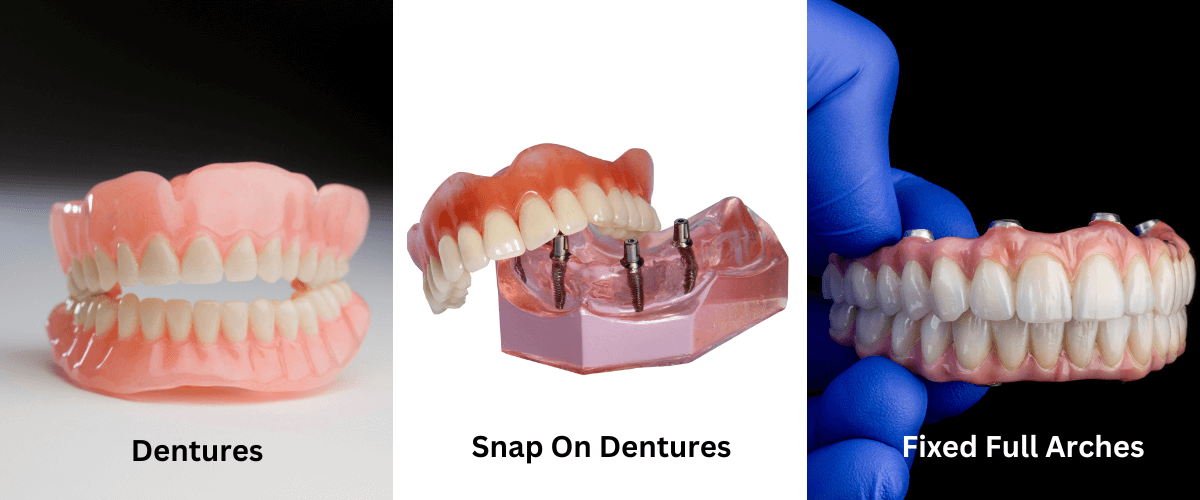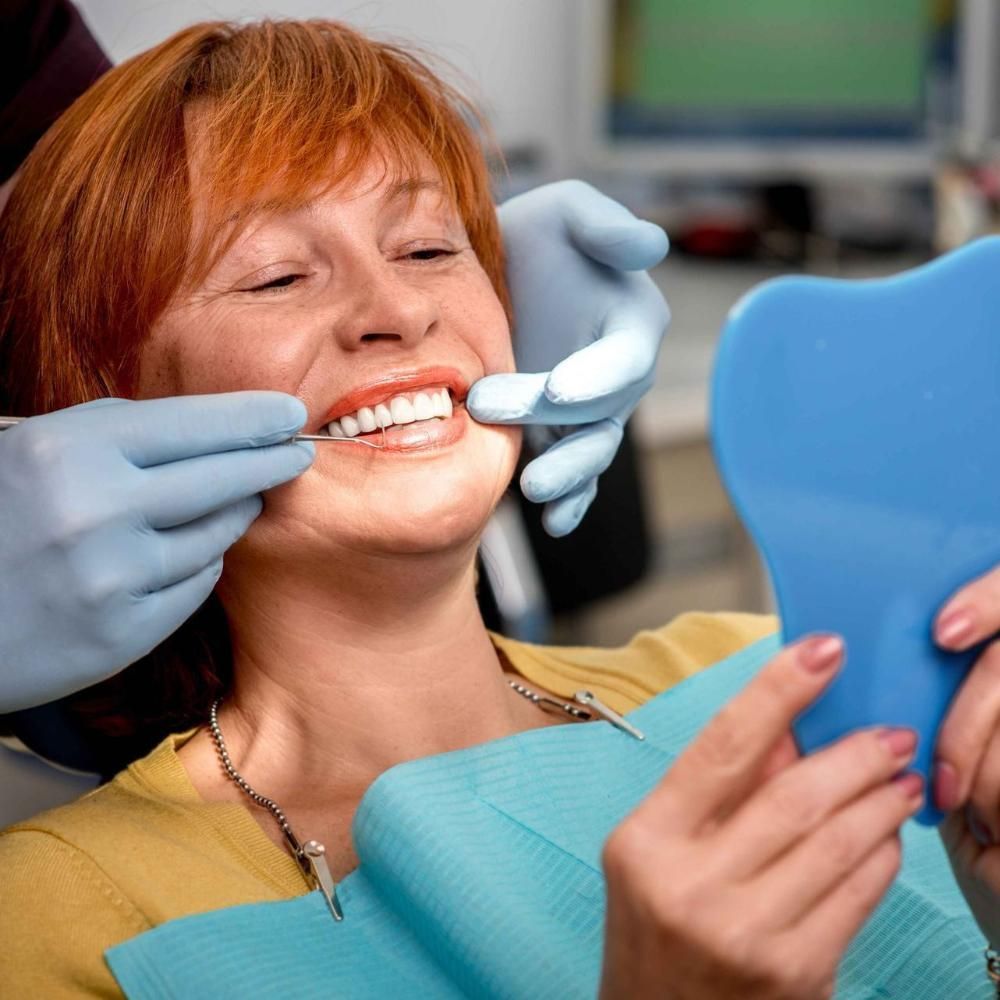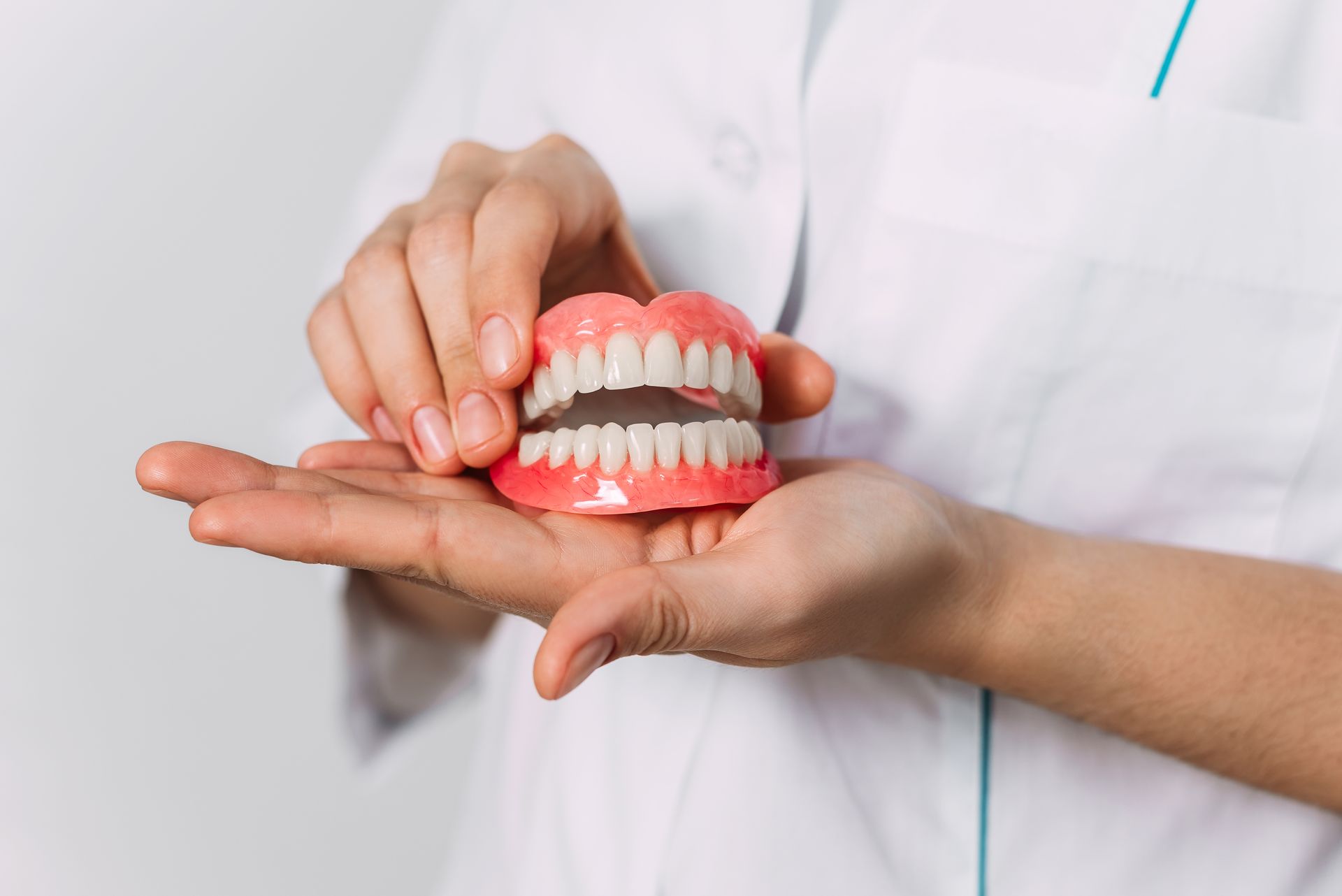Implant Denture: Benefits, Procedure & Care Explained
Implant dentures provide a stable and comfortable solution for replacing missing teeth. Unlike traditional dentures, they anchor directly to your jawbone using dental implants, ensuring they stay in place. Read on to discover what implant dentures are, who can benefit from them, the procedure involved, and their main advantages.
Key Takeaways
- Implant-supported dentures offer enhanced stability and comfort compared to traditional dentures by anchoring directly to the jawbone, significantly improving quality of life.
- Candidates for implant dentures must have sufficient jawbone density, which may require preparatory procedures like bone grafting for those with bone loss.
- Proper care for implant dentures involves regular cleaning routines and dental check-ups to ensure longevity and optimal function.
What are Implant Dentures?

Implant-supported dentures are revolutionary devices designed to replace multiple teeth by anchoring directly to the jawbone through dental implants. Unlike traditional dentures that rest on the gums and are prone to shifting, implant dentures attach firmly to the jawbone, offering unparalleled stability and comfort. This makes them an ideal solution for individuals missing most or all of their teeth, provided there is sufficient jawbone to support the denture implants.
Modern implant dentures mimic the feeling and function of natural teeth more closely than their conventional counterparts. They significantly reduce the chances of embarrassing moments caused by denture slippage while chewing or speaking, enhancing the user’s overall quality of life.
The All-on-4® technique, which uses only four dental implants to support an entire set of teeth, exemplifies the efficiency and effectiveness of implant-supported dentures.
Who Can Benefit from Implant Dentures?
Not everyone is a candidate for implant dentures, but for those who are, the benefits are profound. Individuals who have lost one or more teeth or have irreparably damaged teeth due to decay or trauma often find implant-supported dentures to be a life-changing solution. These dentures are particularly beneficial for those suffering from chronic dental issues, as they provide improved oral health and function.
Before:
Candidates for implant-supported dentures must have sufficient jawbone density to support the implants. This requirement is crucial because the implants act as the foundation for the dentures, ensuring their stability and durability. Preparatory procedures like bone grafting can enhance bone volume for those lacking adequate jawbone density, making them suitable candidates for implant dentures. A thorough evaluation of oral health, including bone density and gum health, is essential during the initial consultation process.
After:
Candidates for implant-supported dentures must meet the following criteria:
- Sufficient jawbone density to support the implants, as this is crucial for stability and durability.
- Consideration of preparatory procedures like bone grafting to enhance bone volume for those lacking adequate jawbone density.
- A thorough evaluation of oral health, including bone density and gum health, during the initial consultation process.
Healthy gums and adequate bone density are key factors in determining candidacy for implant dentures. For those who do not naturally meet these criteria, modern dental techniques like bone grafting can provide the necessary support. This means that even patients with significant bone loss can potentially benefit from the stability and functionality of implant-supported dentures after appropriate preparatory treatments.
Types of Implant Dentures

Implant-supported dentures come in two main types: fixed and removable, each providing unique benefits and catering to different needs. Fixed implant-supported dentures offer a permanent solution that stays securely in place, while removable implant-retained dentures provide the flexibility of being taken out for cleaning.
Understanding these options helps in making an informed decision based on personal preferences and dental health requirements.
Fixed Implant Supported Dentures
Fixed implant-supported dentures are a non-removable solution that provides exceptional stability and comfort. These dentures are permanently attached to the dental implants, meaning patients cannot remove them at home. Typically, a full arch of fixed implant-supported dentures requires six to eight implants, though the All-on-4® technique simplifies this by using just four strategically placed implants. This method is particularly beneficial for those with sufficient bone density throughout the arch.
Cleaning fixed implant-supported dentures requires special tools to ensure thorough maintenance, similar to natural teeth. While they cannot be removed at home, professional dental cleanings help maintain hygiene and prolong the lifespan of the dentures. The All-on-4® technique not only simplifies the process but also offers a fixed solution that enhances daily activities like eating and speaking.
One of the standout features of fixed implant-supported dentures is their ability to provide stronger support and greater stability compared to traditional dentures. This stability significantly improves the user’s quality of life by allowing them to enjoy a wide variety of foods without worrying about denture slippage or discomfort.
For those seeking a long-lasting and reliable solution for extensive tooth loss, fixed implant-supported dentures are an excellent choice.
Removable Implant Retained Dentures
Removable implant-retained dentures offer a convenient alternative for those who prefer the ability to take out their removable dentures for cleaning. Unlike traditional dentures, these are securely anchored by dental implants, providing significantly improved functionality and stability. This allows users to enjoy a variety of foods that might be difficult to chew with conventional dentures.
These dentures remain securely in place during daily activities and are only removed for cleaning purposes. This blend of stability and convenience makes them an attractive option for many patients.
By utilizing areas with plentiful bone for implant placement, removable implant-retained dentures ensure a secure and comfortable fit, enhancing the overall dental experience.
The Implant Denture Procedure

The journey to receiving implant dentures involves several stages, each crucial for ensuring a successful outcome. From the initial consultation and planning to the implant placement and final restoration, the entire process spans several months and requires multiple visits to the dental office.
Although it takes longer than getting traditional dentures, the results are well worth the wait, providing a stable and durable solution for missing teeth.
Initial Consultation and Planning
The first step in the implant denture procedure is the initial consultation with a prosthodontist, who specializes in these types of dental restorations. During this visit, the prosthodontist assesses the patient’s oral health, including jawbone density and gum health, to determine their suitability for implant dentures. This comprehensive evaluation often includes jaw measurements and 3D diagnostic scans, providing a detailed view of the patient’s dental structure.
An essential part of the initial consultation is discussing the estimated costs and timeline for the treatment. This helps patients understand the financial and time commitments involved. For those considering the All-on-4® method, this consultation provides an opportunity to learn about its specific benefits and requirements from an expert.
Implant Placement and Healing
The next phase involves the surgical placement of the dental implants into the jawbone. This minor procedure is usually performed under local anesthesia and takes about one to two hours. For patients with significant bone loss, bone grafting may be necessary before implant placement to ensure there is enough support for the implants.
After the implants are placed, a healing period follows, during which the implants integrate with the jawbone in a process known as osseointegration. This crucial step ensures that the implants are securely anchored, providing a stable foundation for the dentures. During this time, a temporary denture may be used to maintain functionality and aesthetics.
This involves another minor surgical procedure but is essential for the secure attachment of the permanent denture. The healing period varies, but it typically lasts several months, ensuring that the implants are well-secured before proceeding to the final restoration phase.
Final Restoration
The final phase of the implant denture procedure is the creation and fitting of the permanent denture. This step ensures that the denture fits precisely and comfortably, providing a natural look and feel. The All-on-4® technique allows for immediate functionality after surgery, making it a popular option for those seeking quick results.
Bar-retained dentures, another type of implant-supported restoration, use a metal bar connected to multiple implants for enhanced stability and support. This option is particularly suitable for patients with significant bone loss.
Overall, the final restoration bone grafts phase significantly enhances the stability and comfort of the dentures, ensuring a high-quality dental solution.
Benefits of Implant Dentures

Implant dentures offer numerous benefits over traditional dentures, from improved stability and comfort to better chewing and speaking abilities. They also help preserve bone density and facial features, making them a comprehensive solution for those with extensive tooth loss.
Enhanced Stability and Comfort
Because they are anchored directly to the jawbone, they do not shift or wobble during daily activities like eating and speaking. This stability not only improves functionality but also boosts self-confidence and self-esteem by eliminating the fear of dentures slipping out of place.
For those seeking a long-term solution for missing teeth, implant dentures are a cost-effective and durable option. They provide a level of comfort and stability that traditional dentures cannot match, significantly enhancing the user’s quality of life.
Improved Chewing and Speaking
Implant dentures are designed to mimic the natural teeth’s function, allowing for a more comfortable and efficient chewing experience. This improvement enables users to enjoy a wider variety of foods without the discomfort or difficulty often associated with traditional dentures. Additionally, implant-supported dentures enhance speech clarity, reducing the likelihood of slurred or unclear words.
The design features of implant-retained dentures contribute to their superior functionality. By providing a secure fit, they alleviate many of the concerns faced by users of conventional dentures, making everyday activities like eating and speaking much more enjoyable and stress-free.
Preservation of Bone and Facial Features
Another critical benefit of implant-supported dentures is their role in preserving bone density and facial features. By replacing some tooth roots, dental implants stimulate the jawbone, helping to maintain its density and structure. This stimulation prevents the bone loss that often occurs with traditional dentures, which can lead to a sunken facial appearance.
Maintaining bone health is crucial for supporting facial structure and aesthetics. Implant dentures not only prevent bone loss but also help preserve a youthful facial contour, contributing to overall facial aesthetics. This makes them an excellent choice for those looking to maintain their appearance and oral health over the long term.
Cost Considerations
The cost of implant-supported dentures can vary widely depending on several factors, including the materials used, the complexity of the procedure, and geographical location. The starting cost ranges from $3,500 to $6,000, but this can increase with the use of advanced techniques like the All-on-4®, which averages between $8,000 and $15,000. Additional procedures like bone grafting can also add to the overall cost.
While the initial investment in implant dentures is higher than traditional dentures, they offer long-term savings due to their durability and reduced need for future dental work. Some dental insurance plans may cover a portion of the cost, and certain dentists offer discounts for multiple implants.
It’s essential to consider these factors and discuss them with your dental provider to understand the full financial implications.
How to Care for Implant Dentures

Caring for implant dentures is crucial to ensure their longevity and functionality. For fixed implant-supported dentures, regular brushing and the use of special cleaning tools like floss threaders and interproximal brushes are recommended. These tools help clean underneath the dentures where traditional brushes cannot reach.
For removable implant-supported dentures, daily removal allows for thorough cleaning, similar to natural teeth. Regular dental check-ups are also essential to monitor the health of the gums and the condition of the implants, ensuring that any issues are addressed promptly.
Comparing Implant Dentures to Other Options
Implant-supported dentures provide a more secure and stable solution compared to other dental options like traditional dentures and dental bridges. They provide a comfortable fit, enhanced functionality, and better long-term oral health outcomes.
Understanding these differences can help you make an informed decision about the best dental solution for your needs.
Traditional Dentures
Traditional dentures are often less stable and more prone to shifting than implant-supported options. Many users require denture adhesive to improve retention, which can be inconvenient and unreliable. Over time, traditional dentures can lead to bone resorption, causing a collapsed smile and changes in facial structure.
For some patients, traditional dentures may still be a suitable choice due to their simplicity and lower initial cost. However, they do not offer the same level of stability and functionality as implant-supported dentures, making them less ideal for those seeking a long-term solution.
Dental Bridges
Dental bridges provide a more stable solution than traditional dentures but still fall short of the stability offered by implant-supported dentures. While bridges require fewer implants, they often do not provide the same level of functionality and can place extra stress on the surrounding natural teeth.
Implant-supported dentures, on the other hand, distribute chewing forces more evenly across the jawbone, reducing the risk of damage to adjacent teeth and providing a more durable and stable solution. This makes them a preferable option for those looking to replace missing teeth with a high level of stability and comfort.
Summary
Implant dentures are a groundbreaking solution for those struggling with missing teeth or traditional dentures. They offer unparalleled stability, improved chewing and speaking abilities, and preservation of bone and facial features. The comprehensive procedure, though time-consuming, results in a durable and aesthetically pleasing dental solution. By understanding the types, benefits, and care requirements of implant-supported dentures, you can make an informed decision about your dental health.
In conclusion, implant-supported dentures provide a superior alternative to traditional dentures and dental bridges. They offer long-term benefits that justify the initial investment and procedural commitment. If you’re considering implant dentures, consult with a prosthodontist to explore your options and embark on the journey towards a more confident smile and better quality of life.




